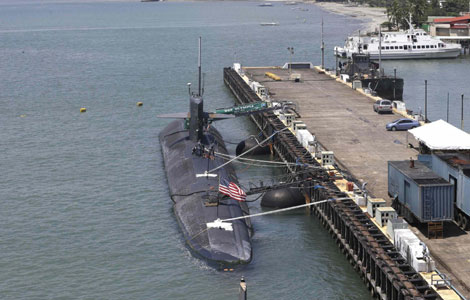Setting sail into uncharted waters
Updated: 2013-06-27 05:48
By Shi Jing in Shanghai (China Daily)
|
||||||||
"I bet you drive a Porsche" is usually the patter that Petersen starts with when he first meets a customer. Once they know Lars was involved in Porsche sales, the ice is broken.
"It's all about guanxi in China," he laughed.

In the first three quarters of last year, Jebsen's marine division delivered eight yachts, hitting a record high of 1.5 boats a month. To carry on the trend, Jebsen Marine has decided to open a new office at Nansha Marina, its third in China after Hong Kong and Shanghai.
Jebsen, a 100-year-old marketing and distribution company, is based in Hong Kong. It made a total revenue of more than HK$15 billion ($2 billion yuan) in 2012, from which the marine division is sure to have sought double-digit growth from the mainland, ever the focus of the group, said Petersen.
Currently, Jebsen has more than 2,000 staff in the region, including 900 in Hong Kong and 1,400 on the mainland. Because Petersen likes to work with the locals, all staff in his division are Chinese apart from himself and one Belgian in Hong Kong who specializes in the sailing boat business.
Being totally positive of what he has achieved over the past two years, Petersen is now confident to plan a little further ahead.
"We have offices in Hong Kong and Shanghai and will have one soon in Nansha to cover the south of China. Hainan is, of course, in the plan. Meanwhile, we are looking at some dealers to cover the north so we can have a network of dealers. Last year, we set the goal of eight new dealers for the next three years. But this could change anytime," he said.
The luxury brands industry in China has been affected by the central government's resolution to crack down on corruption and extravagance. Statistics provided by consulting firm Bain & Co show the growth rate of buying luxury products decreased to 7 percent in 2012, a huge contrast with the 30 percent increase over the past two years.
But Petersen does not show much concern because the company faced the same issues when trying to introduce Porsche into China. He understands that there will be ups and downs. Therefore, the company has chosen to look at the whole industry in longer term, by which time the impact of the government's policy will be less evident.
"For the bigger boats, we are dealing with a very small clientele target group. Someone may be able to afford a boat costing 40 million yuan ($6.5 million). They might be less affected by the policy than somebody buying a luxury watch, if you know what I mean," he laughed.
Zhou Ting, head of the Fortune Character Institute, an organization that studies luxury purchases in China, said that high-net-worth Chinese make up 1 percent of the total population and they will be unlikely to be affected by the policy because "they have a rigid demand for luxury products".
The yachting market in China is booming. It is expected by China Cruise and Yacht Industry Association that there will be more than 100,000 yachts owned by Chinese people within the next 10 years.
At the moment, the pictures seen in promotions in which people take to boats for recreation is still a dream scenario mostly taking place in the West. The yachting industry is not yet regarded as leisure or practiced in a way Jebsen would like to see, Petersen discovered.
"The luxury boats are bought by companies. They buy these boats to show a certain status or wealth, or to use them to entertain customers or clients. Therefore, they prefer bigger boats in general," he said.
Over time, Petersen has learned that most customers would like to have a karaoke room, something rare in the West. He also has a customer who has bought one of the iconic Fairline Squadron 78 Custom boats priced at 41.98 million yuan who asked for a big room in which to hold dinners. It meant the company had to take out a lot of the nice leather chairs that came with it and put in a big table and 12 other chairs so that he can dine and conduct conferences at the same time.
"You can have big parties on the boat, close the doors and do everything you can do at home. But, in addition, you can take your boat out and enjoy some water sports. That's what we are trying to do," he added.
Yang Xinfa, deputy secretary-general of the China Association of the National Shipbuilding Industry, echoed Petersen by saying there is no effective activity in China to teach customers how to make the best use of a luxury boat.
"If customers don't know how to make the best of the boat, of course they won't be willing to buy one," said Yang.
Petersen regards himself as a family person. The night before the first day of the Shanghai boat show, he went to dinner with his daughter, who is studying Chinese in Shanghai, in order to "check out which friends she is going out with".
However, he still prefers to use his yellow Porsche sports car as his iPhone's wallpaper rather than a family photo because he is a German "with fuel in his blood".
Growing up with cars and possessing much enthusiasm for them, it was in many ways like an adventure or going "back to basics" to be appointed the new general manager of Jebsen's marine division. However, Petersen manages to find many similarities between selling cars and boats.
"If you have that kind of gene, it doesn't matter whether it is a car or a boat," he said.

 Visit aids 'trust-building process'
Visit aids 'trust-building process'
 King of Pop returns
King of Pop returns
 Crowds cheer Court decision on gay marriage
Crowds cheer Court decision on gay marriage
 Hiring index signals further job weakness
Hiring index signals further job weakness
 Dance becomes popular stress relief
Dance becomes popular stress relief
 Philippine, US start Naval exercise in S China Sea
Philippine, US start Naval exercise in S China Sea
 Supreme Court gay rights ruling celebrated across US
Supreme Court gay rights ruling celebrated across US
 Rudd returns as Australian PM after Gillard
Rudd returns as Australian PM after Gillard
Most Viewed
Editor's Picks

|

|

|

|

|

|
Today's Top News
US Senate approves landmark immigration bill
US collects Internet data on citizens
More Americans see Snowden as patriot: Poll
Visit aids 'trust-building process'
Crowds cheer gay marriage decision
Industry enjoys profitable month
China's civil servants top 7 million
King of Pop returns
US Weekly

|

|







